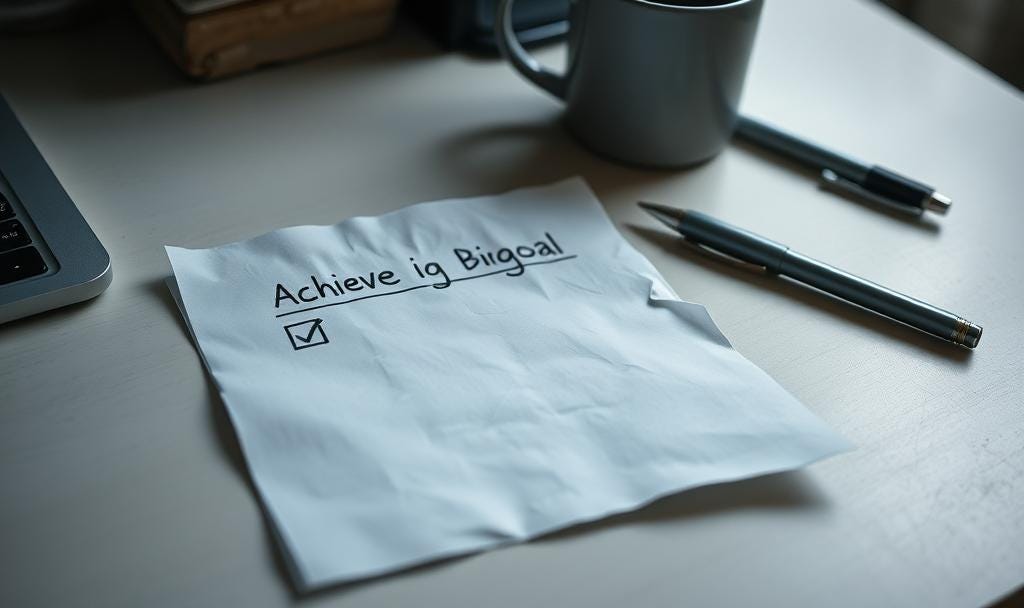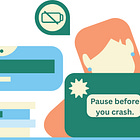When the Win Doesn’t Feel How You Thought It Would
You crossed the finish line, expected fireworks, and got… mild dissociation instead.
Hey, checking in, because the quiet stuff matters too.
Today’s reflection: what happens when reaching the finish line doesn’t feel like a victory lap?
So you did it. You hit the goal. You climbed the mountain. You crossed the finish line you’ve been chasing for months, or maybe years. And now… you feel weird. Not bad exactly. Just… flat? Or tired? Or low-key disappointed by how not magical it feels to finally arrive? You’re not alone. That feeling, the quiet emotional letdown after a big accomplishment, is more common than we tend to admit.
In fact, it has a name: post-achievement depression. As Psychology Today describes it, post-achievement depression involves “a sense of purposelessness or sadness after completing a long-standing goal.” It can bring on tiredness, restlessness, frustration, self-doubt, sadness, or a kind of existential fog. Not exactly what we expect to feel after “making it,” which makes it even harder to talk about.
It shows up in all sorts of places:
Graduates who walk across the stage and wake up the next morning wondering, “Now what?”
New parents who finally bring the baby home, then sit on the couch and cry, not just from joy.
Artists who finish the book or show or album, and feel more lost than triumphant.
Even athletes at the peak of their career, like Coco Gauff, who opened up about emotional fatigue after winning the French Open.
We don’t talk about it much, because we’ve been taught that success is supposed to feel good. Not just good; euphoric. Clean. Redeeming. Like it validates the grind and erases all the self-doubt we carried on the way up. We unpacked that pressure to make growth look impressive here at Joydify:
But in reality, the summit can be lonely. Or anticlimactic. Or exhausting in a way you didn’t expect. You get there, but instead of feeling triumphant, you realize your body still thinks it’s climbing. Your nervous system hasn’t caught up to the view.
The myth of the finish line high
We’re taught to romanticize “the win.” We imagine it as a freeze-frame moment: arms in the air, Rocky music playing, confetti falling, heart full, mood soaring. And sometimes it is like that… for a moment.
But real life doesn’t pause for a victory montage. It just rolls into the next morning, with the same dishes, the same inbox, and the same you; still carrying the weight of what it took to get here. We’ve covered that kind of quiet fatigue here at Joydify:
It’s hard to admit that, because we’re not supposed to complain after good news.
If you feel down after a win, you might think:
I should be more grateful.
What’s wrong with me?
Am I being dramatic?
Was this goal the wrong one?
But none of those are necessarily true. It’s just that finishing something meaningful often leaves an emotional vacuum, and we haven’t been taught how to sit with that quiet, uneasy space without rushing to fill it.
Even the greats feel it
After winning the French Open in June 2025—her second Grand Slam title—21-year-old Coco Gauff made history. She came from a set down to defeat world No. 1 Aryna Sabalenka, becoming the first American woman to win the tournament since Serena Williams in 2015.
It was a full-circle moment. Three years earlier, Gauff had lost her first Grand Slam final on the very same court. She’s since spoken about how crushing that 2022 loss was, and how much she looked forward to one day holding that trophy. Which is what made the emotional aftermath of her 2025 win even more revealing.
In one of her interviews, Gauff shared:
“I feel like mentally I was a little bit overwhelmed with everything that came afterwards, so I didn’t feel like I had enough time to celebrate and also get back into it.”
Not ungrateful; just tired. She acknowledged how hard it is to process big emotions while still performing at the highest level. Even when you’re holding the trophy, your nervous system might still be playing catch-up.
She’s not the only one.
Simone Biles has spoken about post-Olympic depression, and so has Michael Phelps. Many Olympians describe a kind of “emotional hangover” after years of striving toward a singular goal. When they get there, the adrenaline fades, but the emotions don’t know where to go. The drive disappears, and without it, the question looms: Who am I now that I’ve done the thing?
And it’s not just elite athletes. It’s anyone who’s poured themselves into something all-consuming: finishing grad school, running a marathon, getting a promotion. Moving into a dream apartment. Finally paying off debt. Hitting a big follower count. Even planning a wedding.
You pour yourself in, and then… poof… it’s over. You should feel proud. But instead, you might just feel… foggy.
Why does this happen?
There are a few reasons, and none of them mean you’ve failed to “appreciate the moment”:
Nervous system depletion: Big goals often require prolonged stress and adrenaline. Once the goal is done, your system crashes. Your body goes, Finally, we can exhale! and that exhale might feel more like fatigue than bliss.
Loss of direction: When you’ve been focused on one thing for so long, accomplishing it can create a vacuum. The structure is gone. The forward momentum pauses. That space can feel scary.
Unmet emotional expectations: If you secretly hoped the win would fix something inside you — validate you, heal you, earn you love — it can be jarring to discover that nothing internally changes, even if everything externally does.
Delayed grief: Sometimes, achieving a goal brings up everything you lost along the way: time, energy, relationships, even parts of your identity. That grief might not arrive until the applause fades.
So what do we do with that emotional crash?
We start by naming it.
This feeling isn’t a flaw. It’s part of the arc. And naming it doesn’t take anything away from your accomplishment; it makes it more human.
The key is to not rush past the letdown or try to fix it with another goal. (Though it’s tempting. Hello, productivity culture.) Instead:
Let yourself rest. Not as a reward, but as recovery. You earned the exhale.
Resist the urge to define the next thing. You don’t have to pivot right away. Sitting in the space after can be part of the integration.
Talk about it. If you feel weird after the win, tell someone. Chances are, they’ve felt that too.
Find grounding rituals. Not for growth or hustle, but for wholeness; reminders that you’re still you, even without a to-do list.
Celebrate gently. You don’t need fireworks. Maybe just a quiet toast to yourself for surviving the climb.
You’re allowed to feel weird after good things
Success doesn’t always feel like success. That doesn’t make it any less real, or any less earned.
The crash after the climb doesn’t mean you’re ungrateful. It means you’re human. It means your body and your heart are trying to catch up to your timeline. It means that joy, like everything else, sometimes takes a minute to arrive. We’ve explored that limbo, where you’re technically okay, but not quite feeling it, here at Joydify:
And in the meantime, it’s okay to just be a person sitting on the floor of your own life, gently letting the dust settle.
And… also because emotional healing isn’t always grand gestures, here’s a little honest check-in from me this week:
One thing that grounded me:
Lying on the floor for no reason. Five stars. Would recommend.
One thing that ungrounded me:
Trying to find that one tab. You know the one. It was just there.
Your turn. What’s one small thing that grounded or ungrounded you this week?
More reflections you might like:
If you’re new here, here’s your soft landing:







